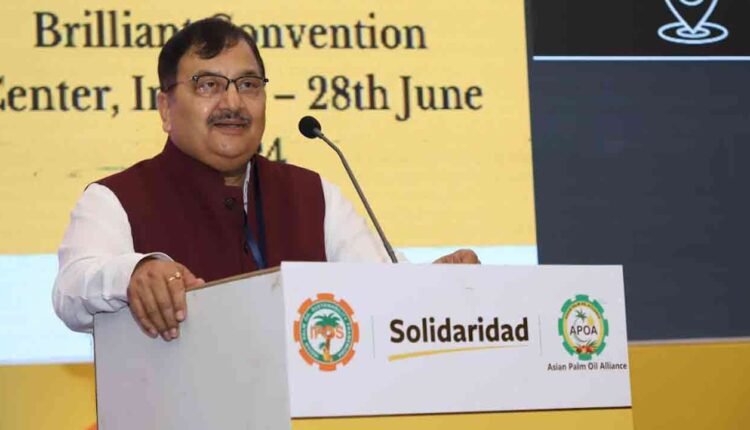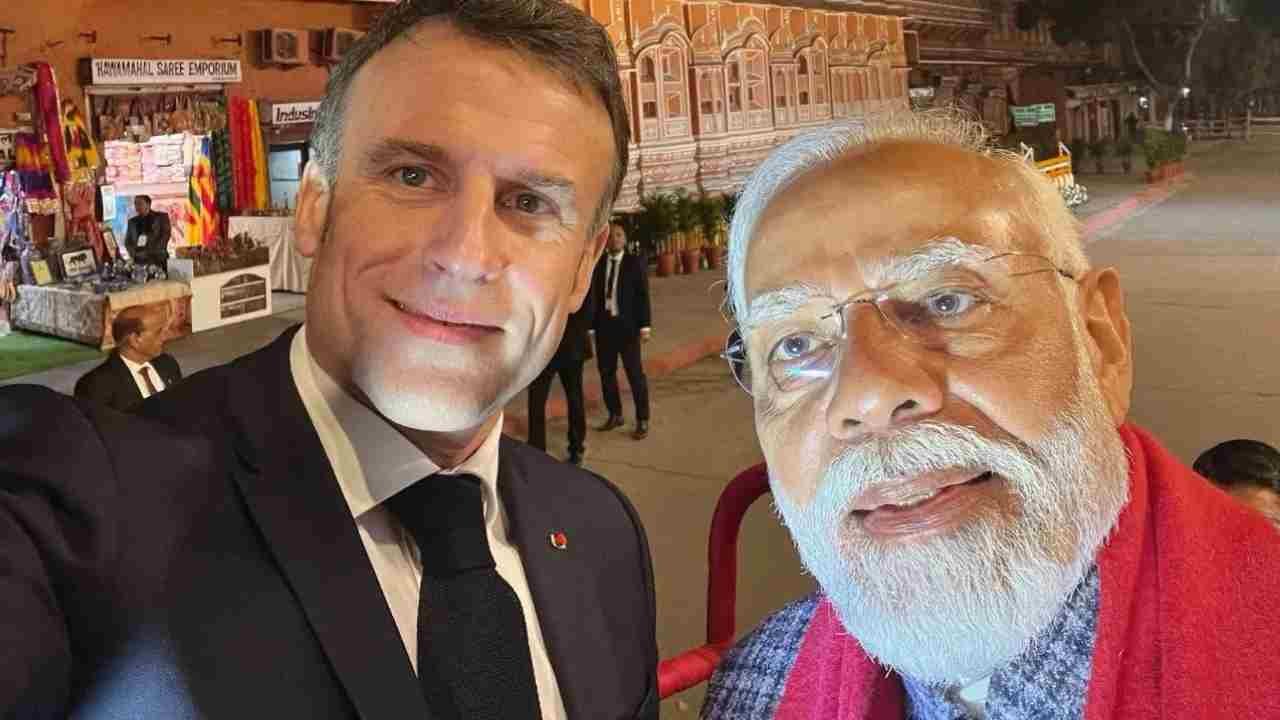Palm Oil Conference In Indore Reshapes Perceptions Of Health And Nutrition
Hyderabad/Indore, June 28, 2024 – The “Palm Oil – Transforming Perceptions for Health and Nutrition” seminar, jointly organized by Solidaridad, Asian Palm Oil Alliance, and SEA successfully concluded at the Brilliant Convention Center in Indore. The event brought together leading nutritionists, scientists, medical professionals, and edible oil industrialists like the Solvent Extractors’ Association of India (SEA), Adani-Wilmar, and Godrej Agrovet Limited to discuss the multifaceted benefits of palm oil and its role in India’s edible oil landscape. Palm oil’s rich nutritional profile was a key focus of the seminar, highlighting its high content of carotenoids and balanced fatty acid composition. Experts discussed potential health benefits associated with palm oil consumption, including improved heart and brain health, antioxidant properties, and support for eye health.

| Some of the discussion highlights: Palm oil’s rich nutritional profile, with crude palm oil being one of the world’s richest sources of carotenoids (500-700 ppm).Potential health benefits include improved heart and brain health, antioxidant properties, and support for eye health. India’s palm oil consumption now exceeds 38% of total edible oil consumption, followed by soybean oil (21%), mustard oil (14%), and sunflower oil (12%).Plans to expand oil palm cultivation area by an additional 0.6 million hectares by 2025-26, aiming for a total of 1.0 million hectares.Projected production of crude palm oil to reach 1.12 million tonnes by 2025-26 and 2.8 million tonnes by 2029-30. |
The event also addressed India’s growing reliance on palm oil, which now exceeds 38% of the country’s total edible oil consumption. To meet this demand, plans were outlined to expand the oil palm cultivation area by an additional 0.6 million hectares by 2025-26. This expansion is expected to significantly boost domestic production, with projections indicating that crude palm oil production could reach 1.12 million tonnes by 2025-26 and further increase to 2.8 million tonnes by 2029-30, marking a substantial step towards India’s goal of self-sufficiency in edible oil production. This seminar recognizes the government’s ambitious target for achieving self-sufficiency in edible oils and is linked to the National Mission on Edible Oils- Oil Palm which is an essential step towards making India ‘Aatmnirbhar’ in edible oils. It aims to deconstruct myths and misconceptions that exist about the relationship between health and the environmental impact of palm oil.
Atul Chaturvedi, Chairman Asian Palm Oil Alliance, stated: “India, as the world’s largest importer of palm oil, is committed to becoming self-sufficient in edible oil production. Palm oil has been a staple in various food and non-food products in India for centuries. However, in recent years, misleading reports about its impact on health, nutrition, and the environment have surfaced, causing harm to our farmers, especially smallholders, and negatively affecting our economy. This seminar aims to change public perceptions about palm oil by presenting scientifically accurate information.”
Dr. Shatadru Chattopadhyay, Managing Director, Solidaridad Asia, emphasized: “We are actively engaged in promoting sustainable practices in the palm oil sector through initiatives such as the India Palm Oil Sustainability (IPOS) standards platform. Despite its pivotal role, palm oil faces negative perceptions fueled by myths regarding its environmental and health impacts. These misconceptions not only harm the industry’s reputation but also affect the Indian economy, particularly impacting palm oil farmers and smallholders. Our efforts focus on dispelling these myths and promoting accurate information to support both sustainable palm oil production and the livelihoods it sustains.”
Mr. Ajay Jhunjhunwala, President SEA said: We are committed to promoting sustainable practices in the Indian palm oil industry. By encouraging farmers to adopt the Indian Palm Oil Sustainability Standard, we aim to ensure that our agricultural practices are environmentally friendly and socially responsible. We urge companies to support this initiative by purchasing palm oil that meets these standards.
Dr BV Mehta, Executive Director SEA, highlighted the economic significance: “India’s import of approximately 9 million tons of palm oil annually underscores the critical need to improve local production. With palm oil consumption surpassing 38%, and soybean, mustard, and sunflower oils following closely, there is a pressing gap that must be addressed through enhanced local cultivation and support for our farmers. As leaders in the edible oil industry, we are committed to raising the minimum selling price of palm oil to benefit our farmers and strengthen domestic production.”
Dr.. Suresh Motwani, Regional Head of Veg Oil Solidaridad, and Secretary General APOA commented on the exhibition: “With this unique concept of exhibiting palm oil-made products, this seminar stands as proof that palm oil is an integral part of the Indian kitchen. By dispelling myths associated with it, India can surely achieve the Prime Minister’s vision of a self-reliant India in edible oil production.”
Sougata Niyogi, CEO, of Oil Palm Business, Godrej Agrovet Ltd, said: “The National Mission of Edible Oils – Oil Palm is a step in the right direction for our country to reduce the import of edible oil. With a potential to yield 3-4 tonnes/ha/year, it is one of the highest-yielding crops compared to all vegetable oil seed crops. Requiring less water when compared to other crops like sugarcane and paddy, also enables farmers to have an assured source of income for more than 20 years in addition to an alternate source of income through intercropping. Additionally, with only agricultural land permitted for growing the crop, oil palm also aids in increasing the biodiversity in the region.”
Dr. Vijaya Khader, Former Dean of Acharya NG Ranga Agriculture University and Nutritionist added: “Numerous studies have substantiated the manifold benefits of palm oil across various applications, owing to its versatile characteristics in both edible and non-edible products. Before forming any opinions about palm oil, individuals must educate themselves thoroughly about its attributes. Only then can they make informed decisions, rather than relying solely on hearsay.”
| Name | Designation |
| Mr. Atul Chaturvedi | Chairman, Asian Palm Oil Alliance |
| Dr. Shatadru Chattopadhyay | Managing Director, Solidaridad, Asia |
| Dr. B.V. Mehta | Executive Director, SEA and General Secretary, Asian Palm Oil Alliance |
| Dr. Suresh Motwani | Regional Head Veg oil Solidaridad and General Secretary, Asian Palm Oil Alliance |
| Dr. Vijaya Khader | Former Dean, Acharya NG Ranga Agricultural University |
| Dr. Puah Chiew Wei | Director of Strategy and Policy Council of Palm Oil Producing Countries (CPOPC), Indonesia |
| Dr. Sanjit Kanjilal | Senior Principal Scientist CSIR- Centre for Lipid Science and Technology, Government of India, Hyderabad |
| Dr. Pravesh Hargaonkar | Dermatologist and Medical Cosmetologist Indore |
| Mr. Anupam Barik | Former Additional Commissioner (Oilseeds) Department of Agriculture & Farmers Welfare, Government of India |
| Ms. Bhavna Shah | Deputy CEO, NK Proteins Ahmedabad |
| Mrs. Vandana Joshi | Entrepreneur Indore |
| Mr. Sougata Niyogi | CEO, Oil Palm Business, Godrej Agrovet Ltd |
| Dr. Danish Azmi | Medical Officer |
| Mrs. Vidya Joshi | Entrepreneur, Indore |
Distinguished Speakers who attended:
The seminar succeeded in addressing common misconceptions about palm oil and highlighting its positive attributes, paving the way for a more informed and sustainable approach to palm oil production and consumption in India. With the import of RBD Palm olein oil reaching 1237 million tons, the event underscored the importance of domestic production in meeting India’s growing edible oil needs.
About Solidaridad:
Solidaridad has been a frontrunner in sustainable economic development and champions the cause of small and marginal farmers, workers, and miners. The organization fosters sustainable and inclusive supply chains, focusing on bringing prosperity; harnessing inclusivity, and producing in balance with nature.
With over 50 years of experience in developing solutions to make communities more resilient, Solidaridad employs around 1,000 expert staff as boots and brains on the ground, operating in over 40 countries across five continents through eight independently supervised regional offices.
Recognizing markets as pivotal to realizing positive changes in the society and environment, Solidaridad looks at public-private partnerships as an increasingly important mechanism for testing innovations, speeding up change, and taking success to scale. With improved scale and speed, the organization aims to create a pervasive impact in society toward a more inclusive, climate-resilient, and sustainable economy. A pioneer in developing and implementing national sustainability, Solidaridad engages in joint programs with businesses, investors, governments, producers and producer organizations, service providers, labor unions, and other CSOs to bring about effective transformation in the agriculture and mining sectors towards sustainable farming and responsible mining practices.
About Asian Palm Oil Alliance:
Asian Palm Oil Alliance (APOA) is a not-for-profit alliance of palm oil-consuming countries of Asia for sustainable palm oil. APOA provides a common platform for key Asian governments, industry associations, and businesses operating in the policy development, trade, import, and end-use application of Palm Oil. It would strengthen Asia’s role in palm oil sustainability disclosure.
The Asian Palm Oil Alliance was established in September 2022, bringing together representatives from the five largest palm oil-importing countries in Asia: India, Nepal, Bangladesh, Sri Lanka, and Pakistan. The Solvent Extractors’ Association of India and Solidaridad have played key roles in forming this organization, which unites key stakeholders involved in policy-making, trade, import, and the use of palm oil.
About The Solvent Extractors’ Association of India (SEA):
The Solvent Extractors’ Association of India (SEA) was formed in 1963 to help & foster the development of Veg. Oil Industry and particularly the Solvent Extraction Industry in India. Today, SEA is the Premier Association of Vegetable Oil Industry & Trade in India. The association’s present strength is over 700 members and represents Solvent Extraction Plants, Oil Mills, Vegetable Oil Refiners, Vanaspati Manufacturers & Compound feed & Fatty Acids Manufacturers. SEA is the first Association in the Vegetable Oil & Oilseed sector to receive quality standard ISO 9001:2000 registration in July 2004 & later upgraded to ISO 9001:2015. SEA is recognized as a Non-Government Organisation (NGO) by the Ministry of Agriculture, Government of India & has representation on various bodies/committees set up by the Government. And ‘The Trade Promotion Organisation (TPO) by the Ministry of Commerce, Government of India for exports of various oil meals, compound feeds for animal & poultry, and minor oils.
Next Story :
Interstate Gang Held For Swapping Fake Gold At Jubilee Hills Jewellery Store
![Interstate Gang Held For Swapping Fake Gold At Jubilee Hills Jewellery Store]()
Hyderabad, Jan 26 (Maxim News):The Jubilee Hills police have arrested three members of an interstate gang based in Tamil Nadu for cheating a city jewellery store by replacing genuine gold ornaments with fake ones. The suspects include two women from Tamil Nadu and a local accomplice who assisted them in executing the fraud.
Now you can get the latest stories from Indtoday on Telegram every day. Click the link to subscribe. Click to follow Indtoday’s Facebook page, Twitter and Instagram. For all the latest Hyderabad News updates





